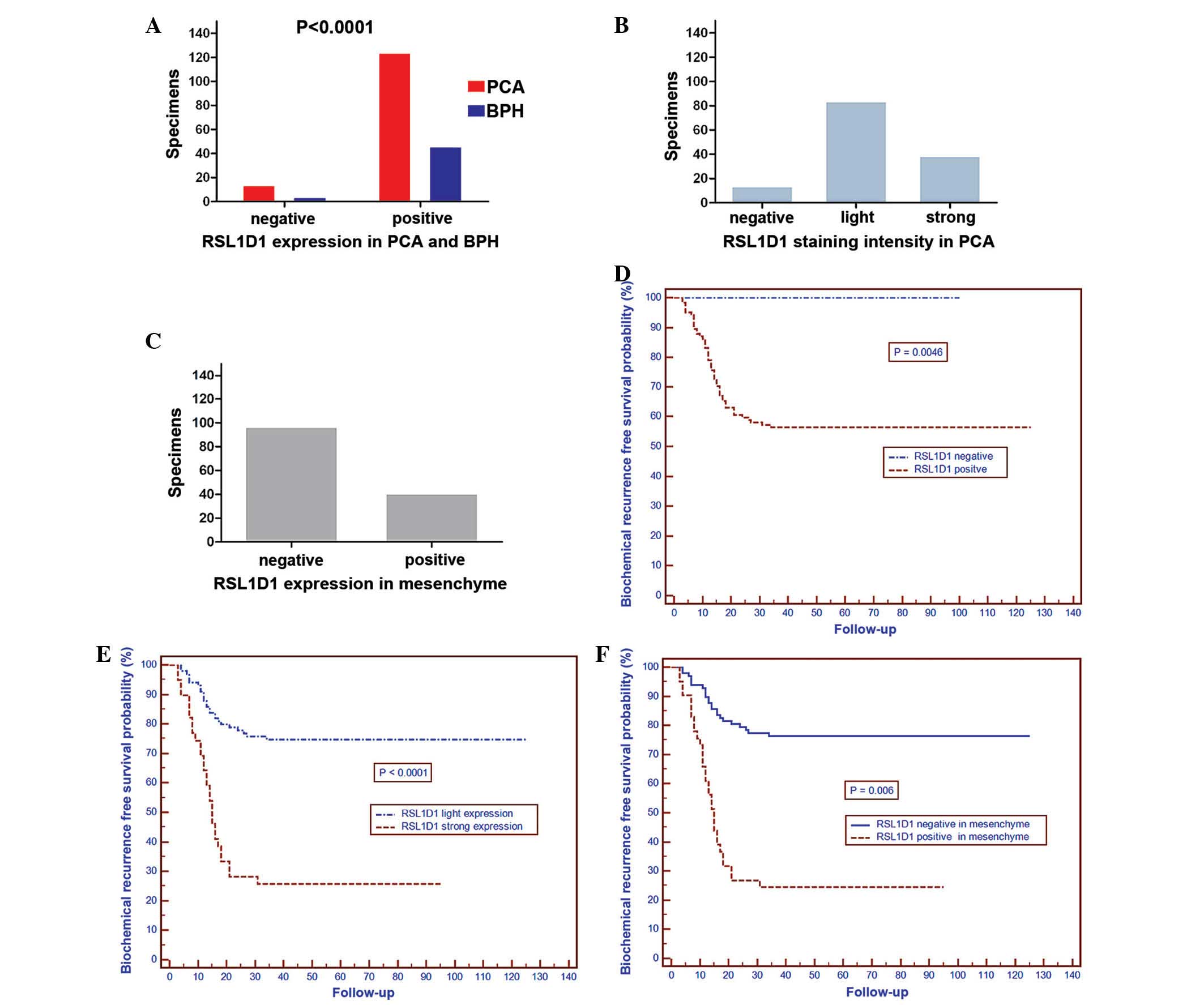|
1
|
Jemal A, Siegel R, Xu J and Ward E: Cancer
statistics, 2010. CA Cancer J Clin. 60:277–300. 2010. View Article : Google Scholar : PubMed/NCBI
|
|
2
|
Gleason DF: Histologic grading of prostate
cancer: A perspective. Hum Pathol. 23:273–279. 1992. View Article : Google Scholar : PubMed/NCBI
|
|
3
|
Ma L, Chang N, Guo S, Li Q, Zhang Z, Wang
W and Tong T: CSIG inhibits PTEN translation in replicative
senescence. Mol Cell Biol. 28:6290–6301. 2008. View Article : Google Scholar : PubMed/NCBI
|
|
4
|
Li N, Zhao G, Chen T, Xue L, Ma L, Niu J
and Tong T: Nucleolar protein CSIG is required for p33ING1 function
in UV-induced apoptosis. Cell Death Dis. 3:e2832012. View Article : Google Scholar : PubMed/NCBI
|
|
5
|
Shen MM and Abate-Shen C: Molecular
genetics of prostate cancer: New prospects for old challenges.
Genes Dev. 24:1967–2000. 2010. View Article : Google Scholar : PubMed/NCBI
|
|
6
|
Narita M and Lowe SW: Senescence comes of
age. Nat Med. 11:920–922. 2005. View Article : Google Scholar : PubMed/NCBI
|
|
7
|
Campisi J: Senescent cells, tumor
suppression, and organismal aging: Good citizens, bad neighbors.
Cell. 120:513–522. 2005. View Article : Google Scholar : PubMed/NCBI
|
|
8
|
Campisi J: Aging, tumor suppression and
cancer: High wire-act! Mech Ageing Dev. 126:51–58. 2005. View Article : Google Scholar : PubMed/NCBI
|
|
9
|
Collado M, Blasco MA and Serrano M:
Cellular senescence in cancer and aging. Cell. 130:223–233. 2007.
View Article : Google Scholar : PubMed/NCBI
|
|
10
|
Choi J, Shendrik I, Peacocke M, Peehl D,
Buttyan R, Ikeguchi EF, Katz AE and Benson MC: Expression of
senescence-associated beta-galactosidase in enlarged prostates from
men with benign prostatic hyperplasia. Urology. 56:160–166. 2000.
View Article : Google Scholar : PubMed/NCBI
|
|
11
|
Castro P, Giri D, Lamb D and Ittmann M:
Cellular senescence in the pathogenesis of benign prostatic
hyperplasia. Prostate. 55:30–38. 2003. View Article : Google Scholar : PubMed/NCBI
|
|
12
|
Chen Z, Trotman LC, Shaffer D, Lin HK,
Dotan ZA, Niki M, Koutcher JA, Scher HI, Ludwig T, Gerald W, et al:
Crucial role of p53-dependent cellular senescence in suppression of
Pten-deficient tumorigenesis. Nature. 436:725–730. 2005. View Article : Google Scholar : PubMed/NCBI
|
|
13
|
Sobin LH, Gospodarowicz MK and Wittekind
C: TNM Classification of Malignant Tumors (UICC). 1:(7th).
Wiley-Blackwell. Hoboken, NY: 2009.
|
|
14
|
Epstein JI: An update of the Gleason
grading system. J Urol. 183:433–440. 2010. View Article : Google Scholar : PubMed/NCBI
|
|
15
|
Prensner JR, Rubin MA, Wei JT and
Chinnaiyan AM: Beyond PSA: The next generation of prostate cancer
biomarkers. Sci Transl Med. 4:127rv32012. View Article : Google Scholar : PubMed/NCBI
|
|
16
|
Lilja H, Ulmert D and Vickers AJ:
Prostate-specific antigen and prostate cancer: Prediction,
detection and monitoring. Nat Rev Cancer. 8:268–278. 2008.
View Article : Google Scholar : PubMed/NCBI
|
|
17
|
Wolf AM, Wender RC, Etzioni RB, Thompson
IM, D'Amico AV, Volk RJ, Brooks DD, Dash C, Guessous I, Andrews K,
et al: American Cancer Society Prostate Cancer Advisory Committee:
American cancer society guideline for the early detection of
prostate cancer: Update 2010. CA Cancer J Clin. 60:70–98. 2010.
View Article : Google Scholar : PubMed/NCBI
|
|
18
|
Balk SP, Ko YJ and Bubley GJ: Biology of
prostate-specific antigen. J Clin Oncol. 21:383–391. 2003.
View Article : Google Scholar : PubMed/NCBI
|
|
19
|
Gleason DF and Mellinger GT: Veterans
Administration Cooperative Urological Research Group: 1974. J Urol.
167:953–958. 2002. View Article : Google Scholar : PubMed/NCBI
|
|
20
|
Antonarakis ES, Feng Z, Trock BJ,
Humphreys EB, Carducci MA, Partin AW, Walsh PC and Eisenberger MA:
The natural history of metastatic progression in men with
prostate-specific antigen recurrence after radical prostatectomy:
Long-term follow-up. BJU Int. 109:32–39. 2012. View Article : Google Scholar : PubMed/NCBI
|
|
21
|
Chade DC, Shariat SF, Cronin AM, Savage
CJ, Karnes RJ, Blute ML, Briganti A, Montorsi F, van der Poel HG,
Van Poppel H, et al: Salvage radical prostatectomy for
radiation-recurrent prostate cancer: A multi-institutional
collaboration. Eur Urol. 60:205–210. 2011. View Article : Google Scholar : PubMed/NCBI
|
|
22
|
Han M, Partin AW, Zahurak M, Piantadosi S,
Epstein JI and Walsh PC: Biochemical (prostate specific antigen)
recurrence probability following radical prostatectomy for
clinically localized prostate cancer. J Urol. 169:517–523. 2003.
View Article : Google Scholar : PubMed/NCBI
|
|
23
|
Miyake M, Tanaka N, Asakawa I, Morizawa Y,
Anai S, Torimoto K, Aoki K, Yoneda T, Hasegawa M, Konishi N and
Fujimoto K: Proposed salvage treatment strategy for biochemical
failure after radical prostatectomy in patients with prostate
cancer: A retrospective study. Radiat Oncol. 9:2082014. View Article : Google Scholar : PubMed/NCBI
|
|
24
|
Cao D, Kibel AS, Gao F, Tao Y and Humphrey
PA: The Gleason score of tumor at the margin in radical
prostatectomy is predictive of biochemical recurrence. Am J Surg
Pathol. 34:994–1001. 2010. View Article : Google Scholar : PubMed/NCBI
|
|
25
|
Meng L, Yasumoto H and Tsai RY: Multiple
controls regulate nucleostemin partitioning between nucleolus and
nucleoplasm. J Cell Sci. 119:5124–5136. 2006. View Article : Google Scholar : PubMed/NCBI
|
















